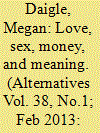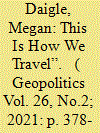|
|
|
Sort Order |
|
|
|
Items / Page
|
|
|
|
|
|
|
| Srl | Item |
| 1 |
ID:
186999


|
|
|
|
|
| Summary/Abstract |
In 2022, Colombia decriminalized abortion, making it ostensibly a site of progressive abortion politics. Within hours, however, the ruling was met with intense, high-level backlash that positioned abortion as a threat to the Colombian family and gestured to gendered conflict harms past and present. Colombia's legal framework on abortion has emerged largely due to campaigning that unfolded during periods of intense political violence and insecurity, in a setting where conflict and (post-)conflict exist on a continuum. Combined, this points to the significance of (post-)conflict politics to understanding abortion politics, and vice versa, in the Colombian space. Here, we use interview data gathered in 2018 to argue that the two should be understood in tandem—and, indeed, that one cannot be properly understood without the other, shaped as they both are by a militant conservative nationalism inflected by religion, machismo and natalism, and by the material legacies of conflict. Decriminalization should therefore be understood as part of resurgent conservative reproductive governance, and abortion politics itself as an agonistic space of contestation rather than straightforwardly progressive. Beyond Colombia, it is also indicative of the rich insights on gender justice in conflict spaces that can be drawn from analysing abortion politics.
|
|
|
|
|
|
|
|
|
|
|
|
|
|
|
|
| 2 |
ID:
117876


|
|
|
|
|
| Publication |
2013.
|
| Summary/Abstract |
Since the disintegration of the Soviet Union and subsequent collapse of Cuba's centralized economy, pursuing relationships with foreign visitors to the island has emerged as a viable means of accessing hard currency, consumer goods, travel, and emigration-of gaining admittance to a perceived better life. In the mid of escalating state repression, a discursive struggle has materialized, assigning meanings to new sexual identities, problematizing these sexual relations, and creating new objects of disciplinary power. Far from simple semantics, defining and naming allows actors within the field of relations-government, police, journalists, mass organizations, individuals-to situate young Cubans within various binaries including good/bad, right/wrong, virtue/vice. Specific labels ranging from crass (puta or prostituta) to enigmatic (candelero or luchadora) have ebbed and flowed in popular parlance, each loaded with different raced and gendered implications and political commitments. As state governance of bodies and sexualities evolves, this ethnographic study demonstrates that many young Cubans have begun to use bodily and sexual practices as tools to circumvent poverty, resist state dictates on morality and austerity, and create new subjectivities. Language, for its part, has become a major weapon, alternately disciplinary and liberatory, in the struggle for (self-)definition.
|
|
|
|
|
|
|
|
|
|
|
|
|
|
|
|
| 3 |
ID:
177717


|
|
|
|
|
| Summary/Abstract |
“Movements back and forth […] between cities, between continents, and across oceans and rivers have made travellers of us all,” posits Ruth Behar, “even Cubans who only dream of going places.” In Cuba since the dawn of the twenty-first century, socio-economic change is rapid, continuous, and uncertain, but one constant is the near-absolute spectre of the border. The idea of intimate liaisons with foreigners as a kind of “travel” serves as a jumping-off point in this article, where the stories of locals and foreigners who pursue romance, love, and sex across borders of all kinds serve to make visible the connections between the intimate and the international. The Cuban setting makes everyday emotional, affective, and sexual practices – and the body itself – a particularly fertile ground for resistance, as well as a lightning rod for disciplinary action, with the potential to enact or disrupt structures of the border through the mechanisms of sex and body – and of pleasure. Through an exploration of pleasure as powerful and political, the intimate – often sidelined as a “feminine” and apolitical sphere – can be revealed as a productive and radically relational mode, a vector of international and transnational relations, and a fertile ground for resistance. As bordering practices assert themselves in multiple and evolving ways both externally (travel restrictions) and internally (social and economic divisions between Cubans and foreigners), this article explores how bodies become a means of circumventing and reinscribing those same geopolitical, ideological, and sexual borders policed by states.
|
|
|
|
|
|
|
|
|
|
|
|
|
|
|
|
| 4 |
ID:
147710


|
|
|
|
|
| Summary/Abstract |
This article explores practices of writing deployed in an attempt (sometimes futile) to mitigate and interrogate the relationship between researcher and informant across the unequal relations of power, economic disparities, and cultural divides – factors that create a partial and committed position for the author. In the process, and through the lens of an ethnographic study of sexual-affective economies in contemporary Cuba, storytelling emerges as a method and methodology for International Relations that facilitates (re)presentation of interviews that are unstructured, contingent, and difficult. Storytelling as a method and methodology reveals the multiplicity, contingency, and uncertainty of the research process, questioning the incitements to detachment and objectivity on which IR methodologies are built. Thus, narrative writing proves invaluable for expressing how the international acts on bodies (and vice versa), and for relating personal experiences of repression and resistance, joy and pain, in an international frame. Far from a merely stylistic choice, storytelling bears real ethical and political implications – for the research produced and for the individual subjects implicated in its production. Along the way, practices of writing themselves come to the fore, as academic conventions fall away and stories surface. Storytelling itself thus elaborates on the possibilities inherent in more creative, less structured, and more interpretive writing across the field of international politics.
|
|
|
|
|
|
|
|
|
|
|
|
|
|
|
|
|
|
|
|
|